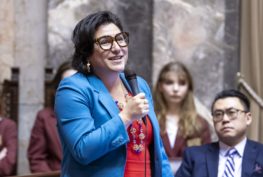Friends, neighbors—
This is a time of uncertainty and worry – for all of us. Together we’re grieving the lives lost to the virus. Together we’re anxious about our own finances, and the future of our economy. Together we’re imagining how kids – and students of all ages – will bounce back after this time out of school.
But we are also finding creative solutions and comfort together. We are recognizing the power of collective action, and the importance of a strong safety net. I have so much faith in our families and friends, neighbors and communities, state agencies and local organizations – and in our ability to support one another through this crisis.
Read on for:
- What our government is doing
- What YOU can do
- A fun fact (because we all need a little levity!)
 |
1. This new website will help keep all our communities informed: coronavirus.wa.gov. Here, you’ll find a frequently-updated compilation of all the coronavirus information from Governor Inslee’s office, our state agencies, the federal Centers for Disease Control and Prevention, and more. I encourage you to explore this website and to pass it on to others in our community who have questions.
Yesterday, the governor issued executive orders to help support Washingtonians impacted by these uncertain times –
- Assistance for renters: Among the measures announced by the governor is a statewide moratorium on evictions of residential tenants for the next 30 days. As Washington faces the economic impacts of COVID-19, no one should be put out of their home as a result.
- Utility rate payer assistance: The governor called on all public utilities in our state to ensure the health and safety of their employees and the public by suspending disconnection of services for nonpayment, waiving late fees for customers who are out of work, and expanding bill assistance programs for customers who’ve been economically impacted by this emergency.
- Assistance for workers: The governor waived the one week waiting period to receive unemployment insurance, which will get more funds in the pockets of unemployed workers. The order is retroactive for claims filed up to March 8, the day of the governor’s first emergency rule expanding unemployment insurance criteria.
- Business assistance: Up to $5 million of the Governor’s Strategic Reserve Funds will be made available as small grants to small business across the state to help prevent closure due to COVID-19. The federal Small Business Administration has also approved the governor’s request for a disaster declaration, which will unlock low-interest loans that help small business meet their financial obligations and cover operating expenses.
- Cash assistance to families: Under the governor’s direction, the state Department of Social and Health Services will expand eligibility for the Family Emergency Assistance Program to include families without children.
- Long-term care waivers: The state is doing a number of things to ease pressure on the long-term care system, especially our nursing homes. This involves suspending rules around nursing home assessment requirements to allow for faster admissions, and suspending inspections and surveys on particular timelines.
- Supply chain flexibility: To ensure the timely delivery of certain goods that are critical during this crisis, the governor is waiving restrictions on hours worked for delivery drivers carrying groceries, medical supplies and equipment, pharmaceuticals, fuel, and pet food and supplies. Shout out to our amazing delivery drivers and all the hard work they’re doing to help us all maintain access to such important goods and services!
2. The single most important thing to do right now is limit contact with others.
To stem the spread of the coronavirus, it’s absolutely crucial to change our normal day-to-day behavior and reduce our exposure to other people. We can reduce the numbers of people who will be exposed, which will in turn reduce the numbers who will test positive, which will in turn reduce the numbers who develop life-threatening illness. We can reduce illness and truly save lives – but only if we take the right steps right now. So: call, FaceTime, or host Zoom get-togethers with friends and family instead of getting together in person. Limiting exposure to others is our responsibility – that’s how we “flatten the curve” (aka keep the number of new cases below hospital and health care worker capacity – here’s a helpful graph to show you what I mean!):
Other important things to do: wash your hands! Health experts recommend washing well – being sure to scrub between your fingers and under your nails, and with good antibacterial soap – for at least 20 seconds. It helps to hum the chorus of your favorite song so that you know you’ve washed your hands for the recommended time. No soap and water handy? Use hand sanitizer with at least 60% alcohol content, and wipe down frequently-touched surfaces with a sanitizing wipe.
3. And here’s some good news!
Our community members have pulled together in such an inspiring way during this emergency – making sure people are fed, housed, and cared for. The disruption to our schools’ schedules has had a particularly negative impact on students that previously relied on school to receive a square meal, but our neighbors have stepped in – in a big way – to keep students fed.
Tacoma Community College, for example, is providing financial, housing, and food support through the TCC Foundation’s student emergency fund and is continuing to operate the Max and Margi Harned Titan Food Pantry so that students aren’t going without basic necessities even as campuses empty and classes shift online. TCC has also done extensive work to provide student access and address equity issues, making sure that students have the equipment for distance learning.
The efforts of our higher education institutions in particular – to take care of their students, faculty, and staff – are nothing new! When I passed my bill last year to establish programs at certain colleges that would support students experiencing housing and food insecurity, our higher ed institutions advocated for that policy the whole way. I’ve been so encouraged by how they and other community leaders throughout the state have taken it upon themselves to take care of everyone, not only in this time of emergency but all the time. I hope this brightens your day the way it brightened mine!
All my best,





